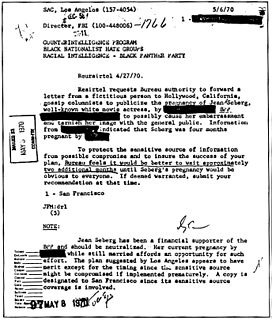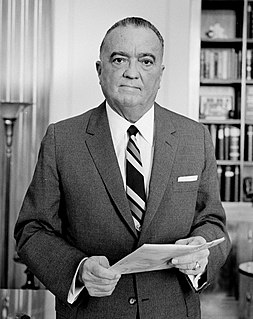Related Research Articles

Cointelpro (1956–1971) was a series of covert and, at times, illegal projects conducted by the United States Federal Bureau of Investigation (FBI) aimed at surveilling, infiltrating, discrediting, and disrupting American political organizations. FBI records show that COINTELPRO resources targeted groups and individuals that the FBI deemed subversive, including feminist organizations, the Communist Party USA, anti–Vietnam War organizers, activists of the civil rights movement or Black Power movement, environmentalist and animal rights organizations, the American Indian Movement (AIM), independence movements, and a variety of organizations that were part of the broader New Left. The program also targeted the Ku Klux Klan in 1964.

The Federal Bureau of Investigation (FBI) is the domestic intelligence and security service of the United States and its principal federal law enforcement agency. Operating under the jurisdiction of the United States Department of Justice, the FBI is also a member of the U.S. Intelligence Community and reports to both the Attorney General and the Director of National Intelligence. A leading U.S. counter-terrorism, counterintelligence, and criminal investigative organization, the FBI has jurisdiction over violations of more than 200 categories of federal crimes.
The FBI Most Wanted Terrorists was a list created and first released on October 10, 2001, with the authority of United States President Bush, following the September 11 attacks on the United States. Initially, the list contained 22 of the top suspected terrorists chosen by the FBI, all of whom had earlier been indicted for acts of terrorism between 1985 and 1998. None of the 22 had been captured by US or other authorities by that date. Of the 22, only Osama bin Laden was by then already listed on the FBI Ten Most Wanted Fugitives list.

John Edgar Hoover was the first Director of the Federal Bureau of Investigation (FBI) of the United States and an American law enforcement administrator. He was appointed as the director of the Bureau of Investigation – the FBI's predecessor – in 1924 and was instrumental in founding the FBI in 1935, where he remained director for another 37 years until his death in 1972 at the age of 77. Hoover has been credited with building the FBI into a larger crime-fighting agency than it was at its inception and with instituting a number of modernizations to police technology, such as a centralized fingerprint file and forensic laboratories.

Robert Philip Hanssen is a former Federal Bureau of Investigation (FBI) agent who spied for Soviet and Russian intelligence services against the United States from 1979 to 2001. His espionage was described by the Department of Justice as "possibly the worst intelligence disaster in U.S. history." He is currently serving 15 consecutive life sentences at ADX Florence, a federal supermax prison near Florence, Colorado.

The Uniform Crime Reporting (UCR) program compiles official data on crime in the United States, published by the Federal Bureau of Investigation (FBI). UCR is "a nationwide, cooperative statistical effort of nearly 18,000 city, university and college, county, state, tribal, and federal law enforcement agencies voluntarily reporting data on crimes brought to their attention".

The FBI Academy is the Federal Bureau of Investigation's law enforcement training and research center located near the town of Quantico in Stafford County, Virginia. Operated by the Bureau's Training Division, it was first opened for use in 1972 on 385 acres (156 ha) of woodland, which is not available for public tours.

The FBI Ten Most Wanted Fugitives is a most wanted list maintained by the United States Federal Bureau of Investigation (FBI). The list arose from a conversation held in late 1949 between J. Edgar Hoover, Director of the FBI, and William Kinsey Hutchinson, International News Service editor-in-chief, who were discussing ways to promote capture of the FBI's "toughest guys". This discussion turned into a published article, which received so much positive publicity that on March 14, 1950, the FBI officially announced the list to increase law enforcement's ability to capture dangerous fugitives.

Robert Swan Mueller III is an American lawyer and government official who served as the sixth Director of the Federal Bureau of Investigation (FBI) from 2001 to 2013.

Carnivore, later renamed DCS1000, was a system implemented by the Federal Bureau of Investigation (FBI) that was designed to monitor email and electronic communications. It used a customizable packet sniffer that could monitor all of a target user's Internet traffic. Carnivore was implemented in October 1997. By 2005 it had been replaced with improved commercial software.
FBi station is an independent, not-for-profit community radio in Sydney, Australia. FBi places a heavy emphasis on local alternative music: it has a policy that at least 50 per cent of its music content is to be Australian, of which at least half comes from Sydney musicians.
The Criminal Justice Information Services Division is a division of the United States Federal Bureau of Investigation (FBI) located in Clarksburg, Harrison County, West Virginia. The CJIS was established in February 1992 and is the largest division in the FBI.

The Behavioral Science Unit (BSU) is the original name of a unit within the Federal Bureau of Investigation's (FBI) Training Division at Quantico, Virginia, formed in response to the rise of sexual assault and homicide in the 1970s. The unit was usurped by the Critical Incident Response Group (CIRG) and renamed the Behavioral Research and Instruction Unit (BRIU) and currently is called the Behavioral Analysis Unit (5) (BAU-5) within the National Center for Analysis of Violent Crime (NCAVC). The BAU-5 currently works on developing research and then using the evidence-based results to provide training and improve consultation in the behavioral sciences—understanding who criminals are, how they think, why they do what they do—for the FBI and law enforcement communities.
The FBI's Crisis Negotiation Unit (CNU) is the part of the Operational Support Branch of its Critical Incident Response Group responsible for the FBI's Crisis (Hostage) Negotiation Program. The mission of the CNU is fourfold, consisting of operations, training, research and program management.

The FBI Buffalo Field Office is the Federal Bureau of Investigation field office in Buffalo, New York, one of 56 field offices in the United States.

The FBI Victims Identification Project is an active research project within the FBI Laboratory to create a national database containing all available records of unidentified human remains. The goal of VICTIMS is to create a federally sponsored national database of unidentified remains. Currently there are many groups attempting to bring closure to an estimated 40,000 unidentified human remains cases nationwide, but VICTIMS is the first attempt to produce a comprehensive approach to the problem.
The FBI Special Advisor Program is an internal consulting and leadership development rotational program of the Federal Bureau of Investigation (FBI). The group consists of recent graduates from the top Master of Business Administration (MBA) programs. FBI Special Advisors are primarily responsible for serving in an advisory capacity to the FBI Senior Executive team and completing "management" type of issues.

The practice of mass surveillance in the United States dates back to World War I wartime monitoring and censorship of international communications from, to, or which passed through the United States. After the First World War and the Second World War, the surveillance continued, via programs such as the Black Chamber and Project SHAMROCK. The formation and growth of federal law-enforcement and intelligence agencies such as the FBI, CIA, and NSA institutionalized surveillance used to also silence political dissent, as evidenced by COINTELPRO projects which targeted various organizations and individuals. During the Civil Rights Movement era, many individuals put under surveillance orders were first labelled as integrationists then deemed subversive. Other targeted individuals and groups included Native American activists, African American and Chicano liberation movement activists, and anti-war protesters.

The Insider Threat Program is the United States government's response to the massive data leaks of the early twenty-first century, notably the diplomatic cables leaked by Chelsea Manning but before the NSA leaks by Edward Snowden. The program was established under the mandate of Executive Order 13587 issued by Barack Obama.

FBI is an American crime drama television series created by Dick Wolf and Craig Turk that airs on CBS, where it premiered on September 25, 2018. The series is produced by CBS Television Studios and Universal Television, with Wolf, Arthur W. Forney, Peter Jankowski, and Turk serving as executive producers.
References
- ↑ Theoharis, Athan G. (1999). The FBI: A Comprehensive Reference Guide. The Oryx Press. p. 30.
| This United States government–related article is a stub. You can help Wikipedia by expanding it. |